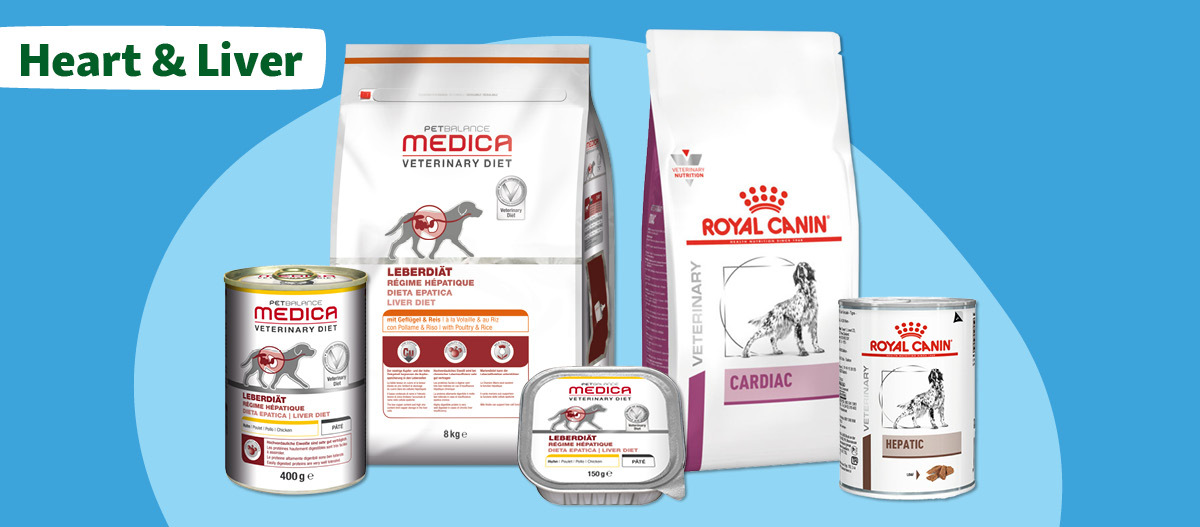Recognising Liver Diseases in Dogs for the Best Chance of Recovery
07.10.2022 - Reading time: 3 minutes

The liver of your dog is an important organ, and above all responsible for ensuring that the metabolism works smoothly.
The main function of the liver is to metabolize nutrients absorbed in the intestine and at the same time to break down toxins. The liver regulates fat, protein and sugar metabolism and stores and produces vitamins. At the same time, it promotes the breakdown of fatty food in the intestine with the bile acid it produces.
The liver fulfils important functions in the dog’s body – and if it gets sick you should act fast and contact a vet.
Recognising liver diseases in dogs
Liver diseases occur quite frequently in dogs. To recognise this early can often be difficult as generally liver diseases only lead to symptoms when they are quite advanced. However, as the liver usually regenerates quickly and well with targeted medical treatment, there is generally a good chance of recovery.
The following symptoms can give early hints of a liver disease in a dog:
- diarrhoea, vomiting and fever
- excessive water intake and increased urination
- Loss of appetite
- weight loss
- lethargy
Signs of an advanced liver disease with dogs:
- weakness
- yellow discoloration of the mucous membranes
- impaired blood clotting
- accumulation of fluid in the abdomen
- muscle twitching and cramps
- strong-smelling, voluminous, light-coloured faeces
What should I do if my dog gets sick with a liver disease?
If you notice one or more of the described symptoms with your dog, you should ask your vet for advice and have your dog examined for liver disease. The vet will diagnose the causative illness with blood work, an x-ray of the abdominal cavity, or a tissue sample, and undertake an appropriate treatment.
If the dog’s liver values are elevated due to a functional disorder, a supportive liver diet should generally be followed, which helps to detoxify and relieve the metabolism.

What liver diseases can dogs get?
A variety of triggering factors can cause your dog’s liver to not function properly. Liver diseases in older dogs, for example, are often the result of other underlying diseases. Poisoning, taking medication over a longer period of time, tumours or obesity can also be possible triggers for a liver disease in dogs.
The following causes for liver diseases in dogs are possible:
- Congenital diseases such as Wilson’s disease or the portosystemic shunt
- Liver fibrosis
- Hepatitis
- Liver tumours
- Damage to the liver caused by poisoning or a lengthy period of medication
- Overweight (adipositas), fatty liver
Wilson’s disease frequently occurs in certain breeds of terrier such as the Bedington Terrier. A genetic defect in this congenital disease results in too much copper accumulating in the hepatic lobules, which triggers a chronically active inflammation of the liver. If the illness is not treated, a liver cirrhosis will develop.
The portosystemic shunt is a malformation of the vessels that run pass the liver and thus restrict the detoxification function of the liver.
Liver fibrosis is a scarring of the liver tissue due to injury or illness. With this scarring, the scarred connective tissue increasingly replaces the functional tissue of the hepatic lobules.
Hepatitis can be triggered by an acute infection or be chronic. Most inflammations of the liver in dogs are chronic; acute hepatitis in dogs (hepatitis contagiosa canis) tends to be rare. You can have your dog vaccinated against hepatitis as a precautionary measure.
Particularly among older animals, we also frequently find cancerous cells in the liver which can be removed depending on the location and size of the tumour. Most tumours in the liver in dogs are secondary tumours, i.e. metastases of another cancerous illness in the animal’s body.
Acute damage to the liver in dogs occurs when the animal has eaten poison, which requires immediate action. A lengthy intake of medication can also permanently damage the liver function.
Considerable and long-lasting obesity is one of the main causes of liver disease in dogs as a fatty liver can develop as a result.
If your dog is showing potential symptoms of liver disease, it is advisable to see the advice of a vet immediately. The earlier the diagnosis is made, the better the chances of curing the disease.


